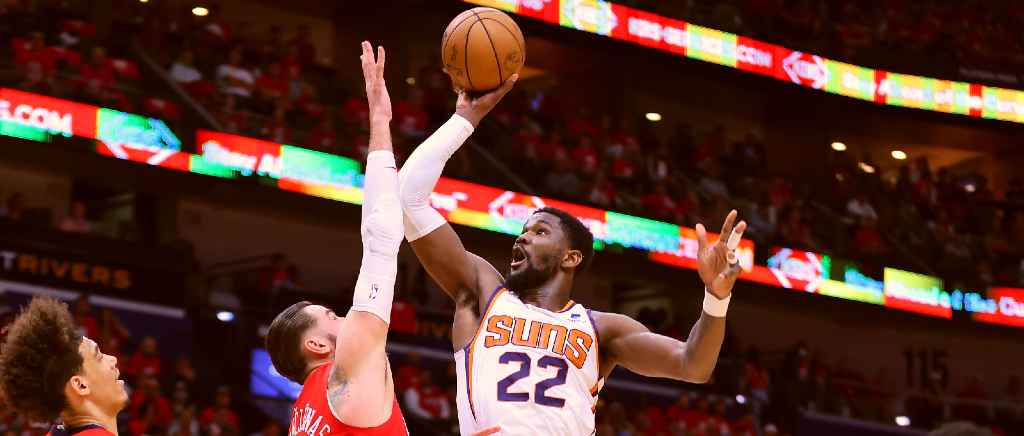
Throughout the first-round matchup between the Phoenix Suns and New Orleans Pelicans, All-Stars Chris Paul, Devin Booker, and Brandon Ingram each enjoyed their moments. All of them, for one reason or another, though, experienced various games of silence. From injuries to shooting struggles to poor decision-making, their typical star impact evaporated on multiple nights.
The most consistent star of this series was fourth-year center Deandre Ayton, who never scored fewer than 10 points or shot worse than 61.5 percent from the field across the six games. Five times, he scored 19 or more. His series-long averages of 20.5 points, 9.8 rebounds, 2.5 assists and 1.2 blocks were exactly that of a star, reinforced by the film and punctuated by defensive artistry.
His 72.1 percent true shooting leads all eligible playoff players. Set for a new contract this summer, he’s dialed up his performance for the second straight postseason.
With Booker sidelined for Games 3-5, Phoenix required Ayton to shoulder an increased scoring load and he delivered, averaging 23.3 points and 15.7 shots in his teammate’s absence. Led by Paul, the Suns employ a pick-and-roll-heavy scheme designed to produce finishes for Ayton, kickouts for open triples, or inevitable midrange jumpers from the Point God.
Ayton’s long benefited from this attack, but displayed substantial signs of growth as a scorer throughout his fourth season. That shined brightly in round one, when he was decisive and aggressive off the catch, quickly let jumpers fly, and wielded ball skills not often seen before this year.
Whether it’s hook shots, floaters, or delicate finishes, his touch is immaculate from virtually anywhere within striking distance of the key. He proved too spry and light off the ground for Jonas Valanciunas to contain him on the catch, bemusing the veteran center for many of his tantalizing buckets inside.
Ayton’s looks weren’t confined to close range either. He buried deep, tough face-up and turnaround jumpers, drove from the perimeter to score through contact and even canned two of his four three-point attempts. His touch is truly special. The confidence he’s now operating with as a shooter and scorer is unprecedented in his NBA career.
According to NBA.com, during the regular season, 13.9 percent of his shots came after 2-6 dribbles. Against the Pelicans, that number sprung to 26.3 percent. He’s a premier release valve and has considerably expanded the way he effectively concludes possessions. Those traits are amplified by his knack for flipping the angle of screens or re-screening to carve space against defenses. Connecting with Ayton likely precedes prosperous offensive results.
Through expanding his scoring repertoire, ball-handlers can feed him in an array of spots and trust that he’ll execute. Setting him up for success demands much less specific situations than it did, say, a year and a half ago. That development greatly eases the responsibility of Phoenix’s initiators, especially when he’s cooking like this. New Orleans deployed an assortment of pick-and-roll coverages to try and frustrate Paul. Ayton was ready to thrive as an outlet regardless of the defensive approach.
Ayton’s shot chart from the first round is a highlighter come to life. Per Cleaning The Glass, he shot 86 percent at the rim (89th percentile among bigs), 70 percent from short midrange (4-14 feet, 96th percentile), 56 percent from long midrange (14 feet to the 3-point line, 79th percentile) and 65 percent overall from midrange (100th percentile).
The man was en fuego, evidenced by the fact that his worst region on the floor produced a sterling 1.12 points per possession.

Ayton’s high-volume, uber-efficient scoring might’ve overshadowed his spectacular defensive series. Both as a helper and pick-and-roll custodian, he consistently quelled the Pelicans’ endeavors.
In ball-screens, his mobility, active hands and recognition of proper angles complemented Phoenix’s point-of-attack stoppers. He and Mikal Bridges are one of the NBA’s foremost pick-and-roll defensive duos, functioning with synergy and a rare ability to impede or extinguish space for opposing teams. When New Orleans involved him in actions, he posed problems and was adept playing against 1-on-2 scenarios.
As a help defender, Ayton etched a similar footprint. His awareness, lively limbs, and mobility enabled him to influence a bevy of possessions, primarily in the paint. According to NBA.com, he’s contested a playoff-high 56 shots within 6 feet of the hoop, where players are shooting 19.9 percent worse than their average.
His verticality and timing were essential, while his 7-foot-6 wingspan deterred numerous other field goals. Confronting him near the rim rarely panned out for the Pelicans.
With Phoenix now set to face the Dallas Mavericks in round two, Ayton will, as he always does during the playoffs, loom large. Luka Doncic is a vastly better pick-and-roll conductor than Brandon Ingram or CJ McCollum. He’s also a more devastating driver and downhill scorer. All of those qualities will challenge Ayton.
On the other end, Dallas’ small-ball 5 rotation of Dwight Powell, Maxi Kleber, Davis Bertans and Dorian Finney-Smith are an ideal matchup for Ayton. Whereas the Mavericks often neutralized Rudy Gobert as a roller by switching or sitting back to defend the lob, Ayton will torch switches and Paul’s intermediate game is more equipped to seize that available space than Donovan Mitchell’s or Mike Conley’s.
Dallas’ cast of rangy, well-connected perimeter defenders will have to overwhelm Paul’s maneuvering as it did Conley to really stymie Phoenix’s pick-and-roll game. But Ayton is a much more malleable and skilled scorer than Gobert, just as he emphasized against New Orleans.
Nobody was more reliable than him. He’s further solidifying himself as a star, one who’s ready to receive the massive payday that’s long overdue.
